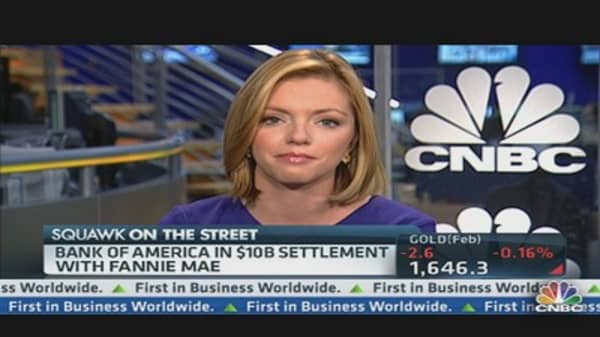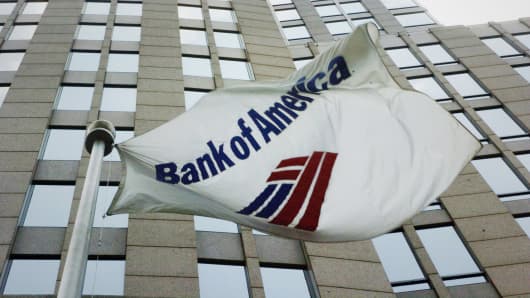On Monday, the Charlotte, N.C.-based bank reached a $10.3 billion deal with Fannie Mae: A $3.6 billion cash payment to cover losses the mortgage giant had already incurred, as well as a plan to repurchase some $6.75 billion in loans it sold to Fannie Mae through the end of 2008.
With the settlement, Bank of America effectively closes the door on what investors feared would be the largest, outstanding liability to the bank's earnings. The settlement will cost $2.7 billion above what the bank had previously set aside in reserves. (Read More: Bank of America Raises Lending After Years of Cuts)
While the settlement wipes the Fannie Mae slate clean — erasing an enormous headache for BAC investors — analysts say there's still little clarity on future risks.
"The problem with these mortgage issues is that the costs have a long tail because of what seems to be never ending litigation," Fred Cannon, director of research at KBW, told CNBC.
In a second deal, Bank of America joins nine other banks splitting an $8.5 billion settlement with the Federal Reserve and the Office of the Comptroller of the Currency over foreclosure-abuse claims.
For its part, BofA will pay $1.1 billion in cash, a sum that will be subtracted from fourth-quarter earnings. In addition it will provide $1.8 billion in "mortgage assistance" — or loan modifications and principal reduction — to settle claims that it was one of a host of banks that improperly foreclosed on homes following the subprime crisis. (Read More: Inside America's Economic Crisis)
It would seem that the spate of Monday headlines — which also included a deal to offload more of its mortgage-servicing portfolio — would be good news for the stock, which initially popped in pre-market trading.
Then came the analyst reports painting a not-so-rosy picture of the deals, which coincidentally came on the deadline for big banks to submit their capital plans to the Federal Reserve. For Bank of America, the risk that impending litigation costs dwarf earnings is the single biggest obstacle to returning capital to shareholders.
Barclays analyst Jason Goldberg acknowledged that the announcements mean the end of at least one longstanding concern on legacy issues, but he noted that "BAC essentially gives up yet another quarter of EPS."
All in, Goldberg tallies Monday's costs at $0.26 per share. That would wipe out the Q4 consensus EPS forecast of $0.19, creating a loss of at least 7 cents a share. (Reminder: Settling legal claims related to the acquisition of Merrill Lynch negated all of the bank's third-quarter 2012 profit, amounting to zero cents per diluted share.)
In another note from JMP Securities, analyst David Trone calculates a $0.21 per-share hit from the settlements, taking his $0.17 estimate for the quarter to a $0.04 per-share loss. While pointing to the resolution of a large liabilities, Trone said that such back-of-the-envelope accounting would "suggest that the problem is over, but as we've seen, the mortgage mess lingers on and on."
Despite analysts' predictions, Bank of America said it expects to be "modestly profitable" when it reports earnings next week. (Read More: Banks to Pay $8.5 Million in Robo-Signing Settlement)
Looking beyond Q4 earnings, Trone expects legacy issues to emerge throughout "the next couple of years" — potentially bad news for investors who hoped the bank would start returning more capital.
Capital plans, including dividends and share buybacks, were due to the Federal Reserve Monday. Some Bank of America shareholders were hoping for a boost to the bank's one-cent dividend.
But when Moynihan was pressed on the topic at a recent industry conference, he merely said: "We need to make sure that we have the recurring earnings stream at the same time."
- By CNBC's Kayla Tausche; Follow her on Twitter: @KaylaTausche, with additional reporting by Jesse Bergman (@JBergmanCNBC) and Margaret Popper (@PopperM)





